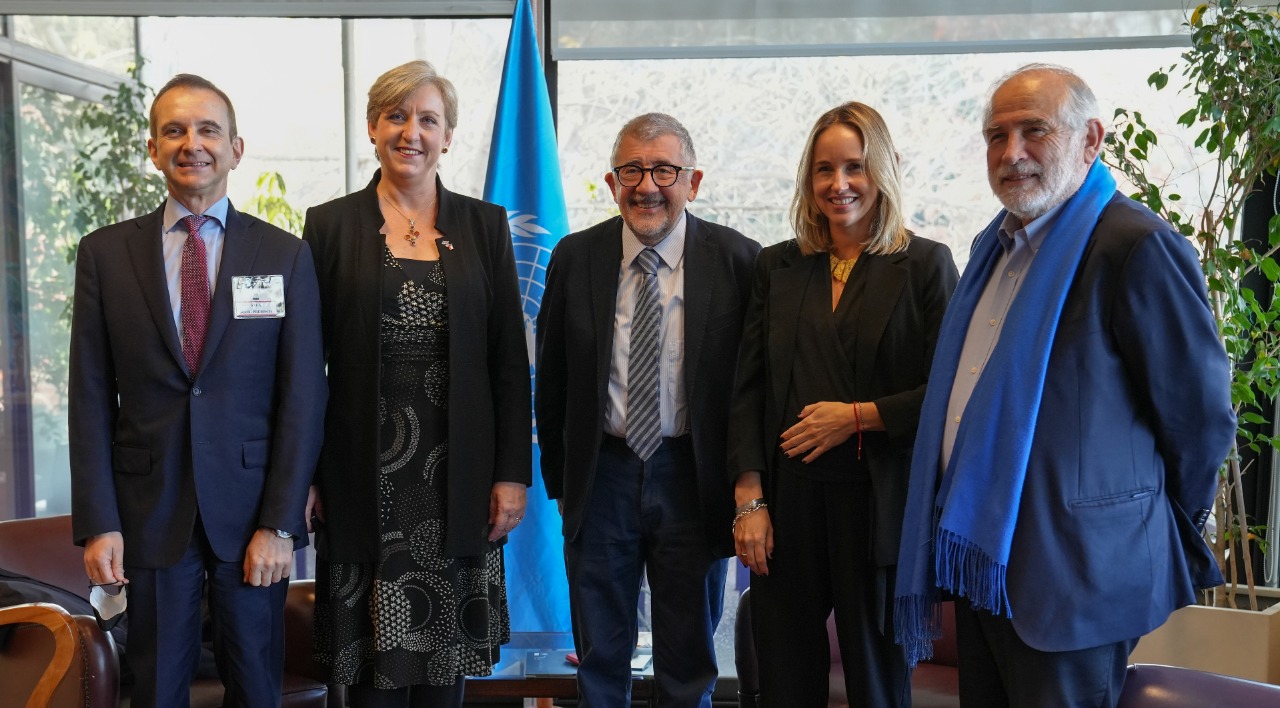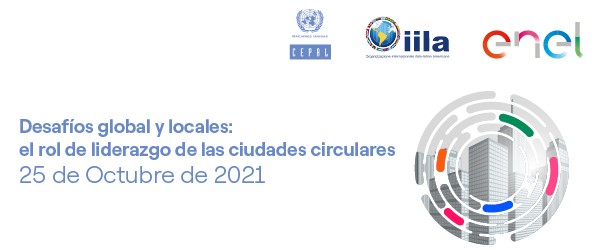Speaking to Territories and Cities is Critical for Rethinking the Development Model in Latin America and the Caribbean
Work area(s)
High-level authorities from Latin America and Europe participated in the first event taking place in the framework of the regional Declaration of Circular Cities.

Cities – due to their importance in economic, social and environmental development – have a leadership role to play in the transition towards circularity by implementing and sharing new models at a local level and taking into account impacts both inside and outside their own city limits, experts agreed today while attending an event organized by the Economic Commission for Latin America and the Caribbean (ECLAC), the embassies of Italy and the United Kingdom in Chile, and energy company Enel.
The gathering entitled Towards Circular Cities in Latin America and the Caribbean: The Challenge of Decarbonization and Electrification, which was the first to be held in the framework of the Declaration of Circular Cities, brought together speakers from Latin America and Europe who reflected on the region’s urban model and made proposals for redesigning the way in which cities evolve, so they can continue to be the driver of innovation and of opportunities for all their residents.
The event was inaugurated by Mario Cimoli, Acting Executive Secretary of ECLAC; Carlos Montes, Minister of Housing and Urban Planning of Chile; Mauro Battocchi, Italy’s Ambassador to Chile; Louise de Sousa, the United Kingdom’s Ambassador to Chile; Claudio Orrego, Governor of the Metropolitan Region of Chile; and Maurizio Bezzeccheri, Head of Latin America at Enel.
Also participating in the gathering were Clara Muzzio, Minister of Public Space and Urban Hygiene for the Government of the Autonomous City of Buenos Aires, Argentina; Juan Carlos Muñoz, Minister of Transportation and Telecommunications of Chile; and Claudio Huepe, Minister of Energy of Chile.
In his remarks, ECLAC’s Acting Executive Secretary recalled that the development process in Latin America and the Caribbean has been characterized by the transition from the production, distribution and consumption patterns associated with rural living and agriculture to the consolidation of the region’s urban character.
He stated that Latin America and the Caribbean has undergone a rapid urbanization process and is today the most urbanized developing region in the world, with more than 81% of its population living in cities. Currently, two-thirds of Latin America’s population lives in cities of 20,000 inhabitants or more, he added.
That is why “speaking to territories and to cities in our region is critical for rethinking the development model,” Mario Cimoli underscored.
The United Nations official noted that urban realities are the place where the biggest economies of scale and of agglomeration are generated – which are key elements for the growth and sustainable development of the region’s countries – and they are also where inequalities, poverty, informality and environmental vulnerability manifest themselves.
He warned that more than 21% of the region’s urban population lives in informal settlements and the reduction in urban informality has decelerated in the last decade.
Mario Cimoli emphasized that circular economy models offer an opportunity to change the processes for generating value and to promote inter- and intra-sectoral structural change, adding that “thinking about circular cities is a call to rethink industrial policies based on a territorial approach.”
He added that the private sector and the international community play a key role in facilitating access to green and digital technologies and driving investment in innovative sectors that would stimulate the creation of knowledge and green jobs.
Finally, ECLAC’s Acting Executive Secretary invited the region’s cities to join the Declaration of Circular Cities, which was signed on October 25, 2021 and has been joined by 9 cities from Latin America and the Caribbean that took on the commitment to promote and accelerate a transition towards greater circularity.
Meanwhile, the Minister of Housing and Urban Planning of Chile affirmed that the circular economy proposes rethinking economic and productive activity in which the value chain would no longer be linear and is understood as a cycle that takes charge of reducing the consumption of raw materials and the generation of emissions and waste during each stage or process.
“This is very important, because we live on a finite planet that is experiencing an extreme situation in which the increase in demand for primary inputs and the scarcity of resources are closely linked to environmental consequences,” the Minister said, warning that the obstacles involved arise precisely from changing a linear production and exploitation model in a given territory, which does not include the negative effects on the environment in its costs.
Meanwhile, Italy’s Ambassador to Chile, Mauro Battocchi, stressed that the challenges are to decarbonize, reduce the intensity of use of energy and natural resources, reduce pollution and the impact of human activities on nature (which will soon have formal rights), alleviate people’s stress and improve the mental health of those living in large urban areas.
“This is a huge task that requires collaboration between governments, international organizations and the public and private sectors, at a regulatory and technological level. It is a task that also extends to communication, since it necessitates ever-greater awareness on the part of citizens,” he indicated.
Louise de Sousa, the United Kingdom’s Ambassador to Chile, highlighted that at the COP26 held in Glasgow in 2021, it was evident that cities are leading the way, accelerating change towards cleaner transport and having greater energy efficiency and more resilient and green infrastructure.
“We know that there are still challenges that must be defused. The United Kingdom’s COP26 presidency is open and ready to work with Latin America to close the gaps, for example, through the Race to Zero campaign, which numerous cities and urban regions in Latin America have already joined,” she stated.
The Metropolitan Region’s Governor, Claudio Orrego, meanwhile, warned that climate change is not “fake news,” but rather a reality that we are seeing with too much frequency and with quite dramatic effects. He urged for resolving the environmental problems that face the region’s cities by overcoming the current fragmentation in urban governance.
Finally, Maurizio Bezzeccheri, Enel’s Head of Latin America, said that Latin America offers a very relevant arena for experimenting, developing, learning and growing. He specified that the region faces a huge phenomenon of megacities and, at the same time, holds relevant examples of how cities can redesign and reinvent themselves.
“Today a person can travel on the Pan American highway from Tierra del Fuego to the United States in an electric car,” he emphasized, stressing the importance of measurement and periodic reports because “it is very complicated to improve or analyze the weaknesses of something that cannot be measured.”
During today’s event, the specialists analyzed cities in the context of the COP26 and the impact of circularity on urban development in Latin America. They also shared success stories from the region’s cities.
The gathering featured a keynote speech about the future of cities, between local and global challenges, from the perspective of Latin America, presented by Antonio Azuela de la Cueva, former Environmental Ombudsman of Mexico and an urban development specialist.
Related content

Desafíos Globales y Locales: el rol de liderazgo de las ciudades circulares evento paralelo a la X Conferencia Italia América Latina y el Caribe
El objetivo de este evento es profundizar en las mejores prácticas, oportunidades y desafíos asociados a esta transición en particular para lanzar la 'Declaración de Ciudades Circulares de América…
Country(ies)
- Latin America and the Caribbean
Contact
Public Information Unit
- prensa@cepal.org
- (56 2) 2210 2040